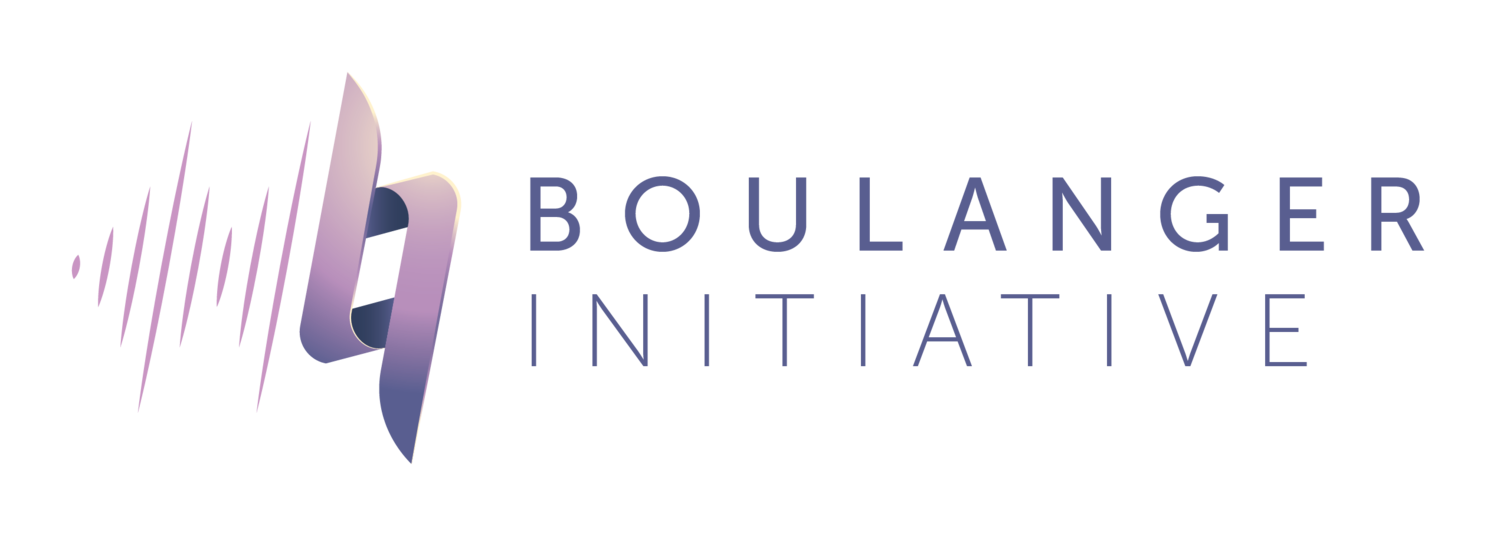Intern Insight: Emily interviews Mariama
Emily: Thank you for joining us for this interview. Tell us about yourself and where you’re from.
Mariama: Thanks for having me! I am from Brazil, and I play the violin. I currently live in Colorado and play with the Colorado Springs Philharmonic and Iris Orchestra. I am also pursuing a doctorate at Colorado University Boulder.
E: How did you hear about Boulanger Initiative?
M: I heard about BI from an Instagram post by Laura Colgate, BI’s Executive Director. We both play in the Iris Orchestra, and once I read about the opportunity to join the Boulanger Initiative team as a research intern, I applied right away.
E: What kind of work are you doing for the organization?
M: I am researching works composed by women to add to BI's database—adding one work at a time with its instrumentation, publisher’s information, score access, year of publication, links for sound and video recordings, links for cd purchase (when available), bibliographical information, and more. It is very fun to find out about the wonderful works I did not know before!
E: Do you focus on a specific geographical area or instrument in your research?
M: I generally focus on Latinx composers and music composed for string instruments.
E: Walk us through your process. How do you research this project?
M: I look for composers I had never heard about, or whose works are not often performed, then I search for that composer’s website and look for their catalog of works. From there, I focus on one composition at a time, looking for scores, recordings, videos, and general information about the composition process. WorldCat and Grove Music Online are essential resources where I can usually find scores, recordings, and bibliographical references. Sometimes, it is also necessary to contact the composer and publisher to ask about scores.
E: Many have asked to join us in our database research. Would you tell us about the training that goes into becoming a research intern?
M: Absolutely! The training that goes into becoming a research intern is led by our wonderful Director of Research Lisa Shiota. She guides us on the best resources and how to make everything as clear as possible when adding works to the database. We have to follow very specific steps and make sure everything is correctly added so that when the database becomes public, there will be no confusion regarding instrumentation, score access, and availability of recordings. Our training directs us to all available resources, teaches us how to navigate them, and shows us how to add the work to the database with as many details as possible.
E: Why do you think these works get overlooked in today’s world?
M: With such easy access to an incredible amount of information, we tend to think it’s easy to access anything, when in fact, it can be quite difficult. That is one of the reasons we receive lots of consultation service requests—the information we provide is accurate, and we make it easy to access!
E: What composers are you focusing on right now, and what are their most interesting aspects?
M: Right now, I am focusing on Jessie Montgomery and Nathalie Joachim. Both of them are amazing composers and performers (Montgomery is a violinist and Joachim is a flutist), and they have accomplished so much in the music industry. Montgomery was just appointed as both violin and composition faculty at the Mannes School of Music, and Joachim was nominated for a Grammy last year with her incredible album Fanm d’Ayiti in partnership with the Spektral Quartet.
E: How many pieces have you inputted into the database this summer?
M: I have added 129 works to the database this summer.
E: Can you tell us about the process of working with someone’s request using our Consultation Service?
M: When I receive a request for a consultation service, I analyze the instrumentation, era, and geographic or any other specifications that may be included. From there, I look for all the works composed for such instrumentation that fits the other categories. When finished, I send an email back to the person who has made the request with all that information!
E: How do you find that Boulanger Initiative’s mission has intertwined with you personally?
M: European ideals have historically dominated the classical music industry and its ‘standard’ repertoire. Even though women composers are getting more chances to have their voices heard, we are still very far from achieving equality. It is even more difficult for composers of color. As one of my doctorate projects, I am planning on recording works by Brazilian women composers. Boulanger Initiative’s work and mission have been of extreme importance and have helped introduce me to some of my home country’s great women composers.
E: Thank you for joining us today, do you have any final thoughts on BI and the equity goal they’re pursuing?
M: I believe BI is reshaping classical music and changing the way performers and ensembles program concerts. BI is paving the way for women composers of color to be represented and valued. I am honored to be part of this organization and so proud of all the work we are doing!
